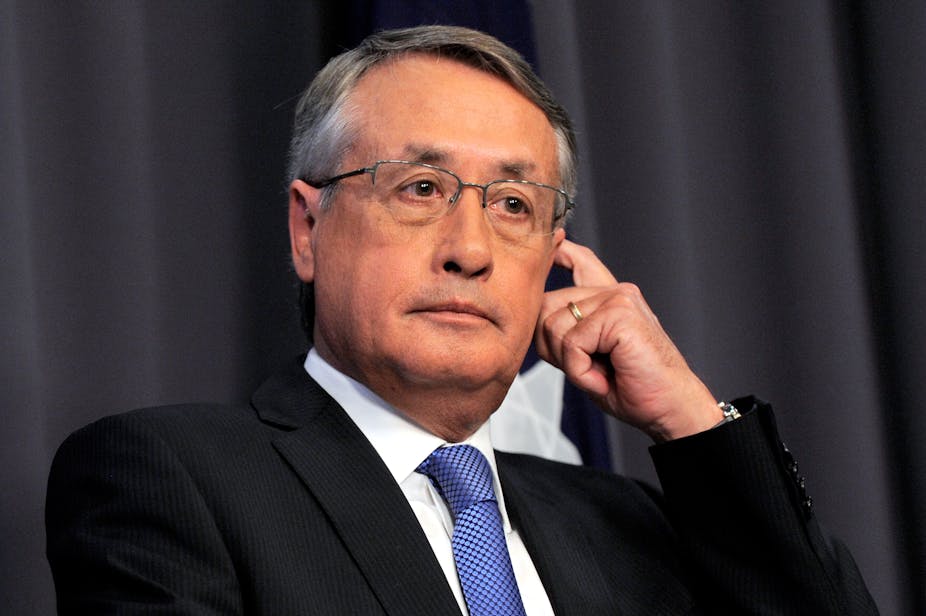Spare a thought for Peter Costello. His successor as Federal Treasurer, Wayne Swan, has just been named Finance Minister of the Year by Euromoney magazine.
It is a bit like seeing the plodding nerd at school, busy doing next week’s homework, winning the dux award.
Some detractors will say it’s outrageous luck that Swan is the Treasurer of a resource-rich country situated in the booming Asia-Pacific.
Others will claim there was hardly a star-studded field. But one thing’s for sure – Peter Costello‘s bile ducts will be overflowing.
Costello was, recall, Australia’s longest-serving Treasurer. His greatest achievements were to steer the country clear of the 1997 Asian financial crisis, notch up a string of budget surpluses and serve up five successive years of personal tax cuts.
There is widespread conjecture that Costello feels aggrieved he never won more plaudits for his long reign.
When he was Treasurer, Costello would delight in teasing his opposite over his command of his brief and Swan’s inability to land a punch.
In the corridors of parliament, he was reportedly heard singing the old Al Jolson number, “Swanee, how I love you, how I love you, my dear old Swanee”. Now Swan has the same bragging rights over the bumbling Joe Hockey.
Nonetheless, Swan is a hard-working treasurer, often appearing on breakfast television to bore us to tears about fiscal trajectories, productivity and what not.
His illustrious predecessor, Paul Keating, won the Euromoney gong in 1984 for his decision to float the Australian dollar and allowing foreign banks to compete here.
Keating wouldn’t have a bar of breakfast television – he’d rather listen to the strains of Mahler than banter with Mel and Kochie on Channel 7’s Sunrise.
But all the personality politics aside, Swan’s most significant achievement was to ensure that Australia avoided being sucked into the vortex of the global financial crisis.
The Labor government deserves the credit for Australia being only one of three OECD economies to avoid recession when the global financial crisis struck three years ago. But they have never cashed in properly on this achievement.
Swan personally deserves this honour for his diligence in craftily using the intellectual firepower of the Federal Treasury.
He followed former Treasury Secretary Ken Henry’s advice to “go early, go hard, go household”. It was clockwork Keynesianism.
Keating had always blamed Treasury for blindly stumbling into the 1990-91 recession and, so there was serious pressure to avoid a repeat.
For all this, though, Swan showed that he was not just a talking clock by refusing to prescribe expenditure cutbacks in his first budget because he suspected that the global economy was heading for tough times.
An interesting fact about Swan is that he likes to surf in his all-too-scarce leisure time. A good surfer, they say, always looks for the seventh wave for a good ride.
But there are always dark undercurrents at play.
While it was Australia greatest Treasurer, Ted Theodore, who gave Surfers Paradise its name, Treasurers and the surf do not really mix.
Fifty years ago, the beach-combing and fun-loving Harold Holt, as Treasurer, was shattered by the recessionary damage he inflicted upon the Australian economy.
While the award gives Swan a boost, the accolade does not, of course, promise invincibility to future economic challenges.
Just two years after his own anointment, Keating faced the embarrassment of the “banana republic crisis” in May 1986, when the newly floated Aussie dollar sank following a terms of trade collapse.
Keating did not help the dollar’s plight by warning that Australia was in danger of becoming a banana republic if it did not reduce its consumption of imports. Then there was the 1991 recession.
It now appears, if the IMF forecasts are right, that the same problem will be Swan’s next big wave to avoid.

